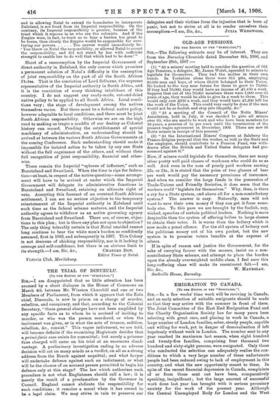OLD-AGE PENSIONS. MO TIDE EDITOR OP THR "spzerAToR2'1
SIR,—The following extracts may be of interest. They aro from the Barnsley Chronicle dated December 8th, 1906, and September 28th, 1907 :-
(1) "At a miners' meeting held to consider the question of Old Age Pensions, a delegate, Mr. James Walsh, appealed to miners to legislate for themselves. They bad the matter in their own hands. In Yorkshire alone there were 315 pits, employing 80,000 men and boys, of whom 63,000 belonged to their Union. He looked to the very near future for these to grow to 70,000. If they had 70,000, they would have an income of .21,410 a week. Suppose that out of the 70,000 members there were 1,000 over 65 years of age, they would be able to give 5s. a week to them. This would only cost £250 a week, and they would have £1,200 left for the work of the Union. This could very easily be done if the men would not be so foolish and stop pits illegally, &c."
(2) "At a meeting of the Council of the Notts Miners' Association, held in July, it was decided to give all miners over 60, who are unable to work and who have been members for 10 years, a pension of 5s. per week until the termination of the present wages agreement in December, 1909. There are now 96 Notts miners in receipt of this pension."
(3) "At the International Miners' Congress at Salzburg the Franco-Belgian proposal that the worker, as well as the State and the employer, should contribute to a Pension Fund, was with- drawn after the British and United States delegates had pro- nounced against it."
Now, if miners could legislate for themselves, there are many other pretty well paid classes of workmen who could do so as well. And even in the case of poorly paid workers earning
23s. or 24s., it is stated that the price of two glasses of beer per week would pay the necessary premiums of insurance. And when we consider the large funds in the possession of Trade-Unions and Friendly Societies, it does seem that the workers could "legislate for themselves." Why, then, is there a cry for a State system, and above all for a non-contributory system ? The answer is easy. Naturally, men will not want to save their own money if they can get it from some- body else. To this pass we are brought by the foolish, nay, wicked, speeches of certain political leaders. Nothing is more despicable than the system of offering bribes to large classes to obtain their votes. It is worse than the bribery which is now made a penal offence. For the old system of bribery cost the politician money out of his own pocket, but the new system is to promise voters benefits at the expense of others.
If in spite of reason and justice the Government, for the sake of currying favour with the masses, insist ou a non- contributory State scheme, and attempt to place the burden upon the already overweighted middle class, I feel sure this long-suffering class will make its resentment felt.—I am, Sackville House, Barnsley.










































 Previous page
Previous page